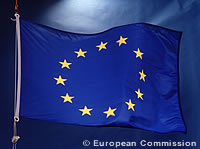Research mobility barriers are ERA barriers - Commission Communication
Obstacles to researcher mobility in Europe are also obstacles to the creation of the European research area (ERA), according to the latest communication on the issue by the European Commission. The communication sets out a strategy to overcome these obstacles, which will not only help to galvanise the ERA, but also address skills gaps, increase cooperation, promote innovation and tackle inequalities. Europe is suffering from a brain drain of researchers, particularly to the USA. Its level of researchers per capita of the workforce is lower than both the USA and Japan. The take up of science and research among young people is also lower than in those countries. And women in the research sector are under represented and often discriminated against in Europe. In addition, the fulfilment of the Lisbon goal of creating a European knowledge-based economy also makes clear that geographic and intersectoral mobility of researchers is key. The Commission's communication aims to address the mobility issue with specific regard to researchers, male and female, public and private sector, at all stages of their careers, within the context of the ERA and outside Europe. The key premise to the communication is that a more favourable transnational environment needs to be created for researchers. This has to address financial, cultural and social elements. The High level expert group (HLG) on improving mobility of researchers, set up in 2000, identified a number of key areas where changes are required. It discovered that problems were particularly acute for researchers working abroad medium term (between two and five years) and that problems were greater for third country researchers rather than other EU researchers. Worse still, there is very little detail of what is happening in the researcher mobility area, as there are very few statistics or benchmarking. Researchers are often not designated as a separate group in surveys. Problems also exist with the perception of the value of researcher mobility. The value of mobility is often not appreciated by the home country when a researcher returns home, and can often lead to difficulties getting back into the system. Even if a researcher is not put off by this, they can often find it difficult to find adequate funding, especially at senior level. Immigration restrictions still pose a major barrier to third country researchers looking to work in the EU and even when already there, further difficulties can be encountered when trying to travel to the non-Schengen countries. Lack of agreements with third countries can lead to the danger of double taxation or loss of pension benefits. And even if the researcher does make a major breakthrough, there is still little harmony (as yet) in terms of intellectual property rights. One area that needs to be tackled urgently is the lack of availability of information on these types of posts in the first place. There is no widespread dissemination of available research posts and even when they are publicised internationally, the submission time is often too short. On a social level, little attention is given to the wider family needs of mobile researchers. Maternity or paternity benefits have a major influence in the attractiveness of foreign posts, as do possibilities of accommodating the 'trailing spouse' of dual career couples. The communication suggests a number of measures which make up a strategy to tackle all of these problems. It divides the measures up into those which are designed to make the environment for researcher mobility more attractive in the medium term and those which are designed to tackle the financial aspects of the issue. The first set of initiatives entails dealing with information supply, establishing mobility centres and ombudsmen, best practice exchange, increased use of statistics and benchmarking, addressing the legal status of mobile researchers and organising high level ministerial meetings on the issue. The Commission plans to set up an Internet portal linking national and Commission sites, with the intention of establishing a one stop European mobility site. Mobility centres will provide a physical place of assistance, giving advice training and complementing existing structures. Any disputes concerning researcher mobility will be settled by national ombudsmen, which the Commission will encourage Member States to set up. More statistics will be gathered on mobile researchers' situation, with more collaboration with the national statistics agencies of the Member States. This will also help in later benchmarking exercises and exchange of best practices, which is likely to take place via a series of workshops. Benchmarking will lead to the drawing up of a 'quality charter', which will highlight expectations and guarantee a minimum level of assistance to mobile researchers. Improvements in the legal situation of researchers have already begun, with the Commission looking into the possibility of establishing an 'EC research card' facilitating easier entry for third country researchers into the European Union. Finally, in addressing the financial support for mobile researchers, 'the Commission states that 'it is of paramount importance that the financial mechanisms go beyond the mere financing of fellowships'. It also points to the provisions made in the forthcoming Sixth Framework programme, which will entail and opening and broadening of instruments to encourage researchers to 'undertake mobility experiences', significant increase and diversification in the availability of funding opportunities, introduction of systematic mechanisms for the return and professional integration or reintegration of researchers, stimulate and promote excellence in European research through financial incentives (thereby increasing its attractiveness), provide more open access to funding for researchers from third countries and give a larger access to funding, through appropriate mechanisms, of national or regional mobility programmes. The Commission will set up, in collaboration with the Member States, a scoreboard, which will maintain a focus on all of the issues related to researcher mobility, updated annually.



